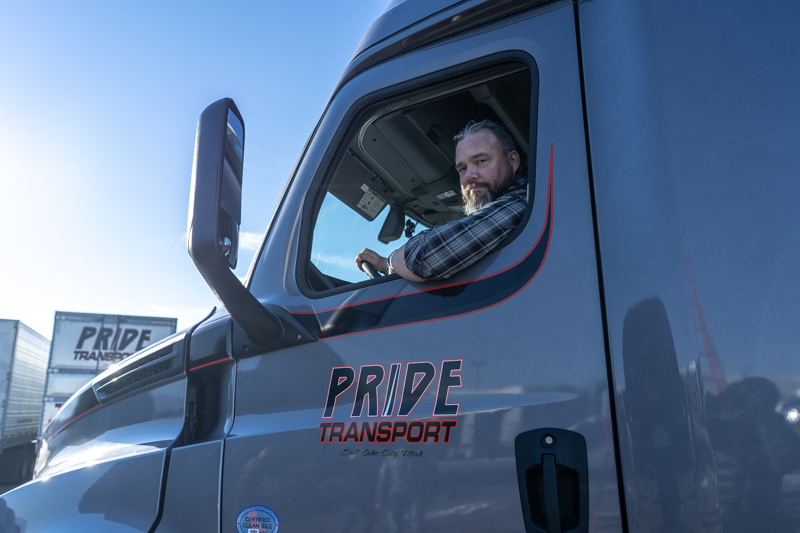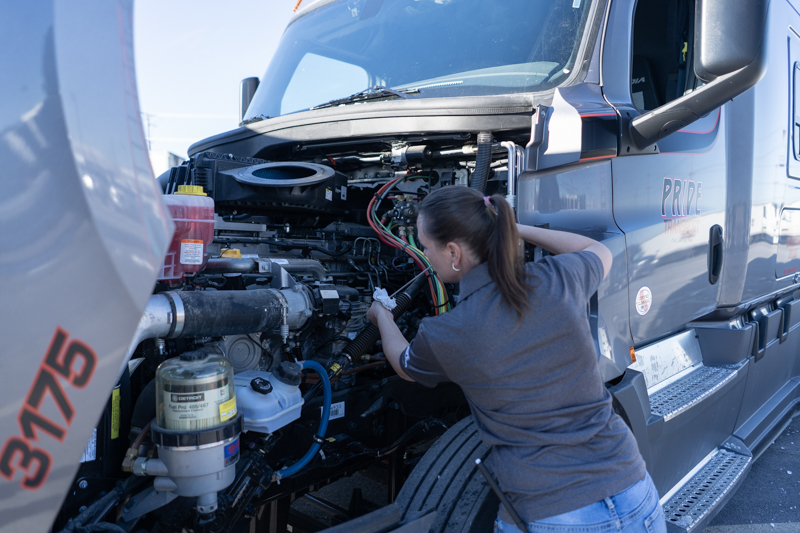by Pride Transport | Jan 17, 2025
Companies conduct MVR checks to ensure their drivers are maintaining clean driving records through safe vehicle operation and adherence to safety regulations. MVR checks help to ensure that the safest drivers are sharing the road with the driving public, upholding safety standards and complying with traffic laws.
Most commercial drivers understand that safe driving is essential for retaining their CDL, but it’s good to know how many different aspects of your driving an MVR check covers so that you’re sure to address every possible safety component. Keep reading to learn more about MVR checks, their importance for both drivers and employers, and tips for maintaining a clean driving record.

What Is an MVR Check?
“MVR” stands for Motor Vehicle Report. DMVs or similar government agencies in each state are responsible for maintaining MVRs for all licensed drivers. An MVR check is used to determine whether or not a driver’s driving record meets company requirements for employment.
MVR checks are just one part of the larger background check required by the Department of Transportation (DOT) for commercial motor vehicle (CMV) drivers. In fact, any industry regulated by the DOT is required by law to conduct MVR checks.
A commercial MVR check varies slightly from a standard MVR check because it includes Medical Certificate information as well as a CDL Information System (CDLIS) search. An MVR check is conducted for any state in which a driver holds a CDL.
MVRs are comprehensive, so a check will show everything related to a driver’s ability to safely operate a motor vehicle. The exact information will vary by state; some states return driving histories for the past decade, while MVRs in other states only go back as far as three years. Regardless of timeline, MVR checks will include information on each of the following items:
Traffic violations
Tickets, citations, or fines for speeding, reckless driving, or any moving violations.
Accidents and collisions
These include any accidents or collisions the driver has been involved in while operating a CMV, even if they were not at fault. The date and location of the accident are included, as well as any citations and assigned fault.
License suspensions or revocations
Any period of time when a driver’s license was suspended or revoked will show up on an MVR check. The reason for the revocation or suspension is also included.
MVR checks also indicate the driver’s license issue/expiration dates and which class of license they’ve obtained. A CDL driver’s license class determines which types of vehicles they’re qualified to drive. Any additional endorsements they’ve earned (e.g., tanker, hazmat, etc.) would also show up in an MVR check.
Traffic points or accumulation
Each state has different rules for how drivers accumulate points for traffic violations, as well as how long violations appear on a person’s MVR.
Violations are assigned point values depending on the severity of the offense. According to Progressive, “More commonplace violations like speeding tickets tend to ‘fall off’ your record quickly, often within 3–5 years. More serious events like at-fault accidents or DUI convictions may remain on your record for significantly longer.”
The Importance of MVR Checks for Truck Drivers
Drivers should be concerned with the status of their MVR because their ability to maintain a clean driving record impacts their job opportunities and ongoing employment.
Successful trucking companies hire safe drivers as a way to protect their customers, the driving public, and themselves:
- Safe drivers are more likely to complete on-time deliveries to customers without incident, which supports strong business relationships and secures future business.
- Regional and over-the-road-(OTR) drivers cover thousands of miles every year, sharing the roads with hundreds of thousands of other drivers. A commitment to safe driving is essential both for the driver’s safety and for everyone around them.
- Safe drivers reflect positively on the trucking company, helping to strengthen the company’s reputation. Safe driving also helps to minimize the risk of any accidents that could lead to legal action against the company or higher insurance premiums.
Trucking companies must meet a variety of safety and compliance regulations, which includes making sure their drivers always follow traffic laws. An MVR check allows carriers to quickly and confidently assess whether drivers have a history of safe vehicle operation that will make them an asset to the company’s safety and compliance efforts.
Can You Check Your Own MVR?
Drivers can (and should!) check their MVR, especially if they’re seeking employment. There could be inaccuracies that you’ll need the DMV to correct to ensure any potential employer accesses your most up-to-date and accurate MVR.
You can request your MVR by calling your state’s BMV or visiting their website. Many states allow drivers to request their MVR through an online service. In most cases, you’ll be asked to provide some basic personal information to confirm your identity before receiving your report. There is also usually a small fee to receive a copy of the record, though this may vary by state.
Even if you don’t choose to check your MVR, trucking companies have policies about how often they conduct MVR checks. The DOT requires carriers to request each driver's MVR every 12 months at minimum. Carriers must also review the MVRs to confirm that drivers meet safety requirements, and keep the record for three years.
Pass Your MVR Check with These Tips
Maintaining a clean MVR doesn’t have to be complicated. As long as drivers regularly engage in safe and responsible driving practices, they’ll have no reason to worry about an MVR check. Staying up to date on state and federal traffic laws and knowing how to drive in bad weather can further boost your safe-driving confidence.
Drivers interested in refining their driving skills should consider taking defensive driving courses to practice or improve everyday maneuvers, especially those that most drivers consider to be tricky, such as backing.
And, if you do get in an accident or are charged with a violation, handle the matter promptly. Taking responsibility quickly can minimize the incident’s impact on your MVR.
At Pride Transport, we do everything we can to provide our drivers with the best possible safety equipment and training to better ensure that every mile is a safe one. To join our fleet of professional drivers, check out Pride’s driver job board today!